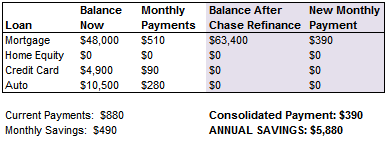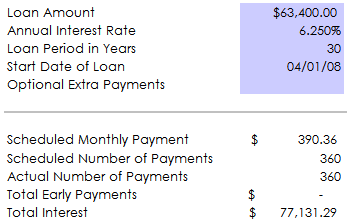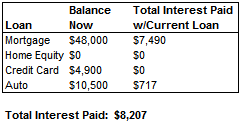How do I know this?
Well, because they tell me so.
For rock-solid proof of this, why just this weekend I received a quaint laser-printed love-letter from them. It informed me that:
Tap into your home's equity for the cash you need to consolidate your high-rate monthly payments into one lower monthly payment. A debt consolidation loan from Chase can combine your credit cards, auto loans, and other high interest loans into one easy, time-saving monthly payment. Here is an example of how much you could save each month.
Below that was a chart that looked pretty much like so:

Wow! Chase loves me so much, they customized the numbers for their example by checking my credit report! Sure, the figures are old now, but they were in the ballpark at one point. (What they don't know, of course, is that any credit-card debt they see on my report is paid in full each month. So much for that "high interest" they love to guard me against.)
But what a great deal, huh?
Chase pegs my current monthly payments at $880. Because they're looking out for my wellbeing, they've created an offer that'll drop my monthly payments to $390. I'd be saving $490/month in payments just by signing up!
Are these guys pals, or what?!
Put a Spreadsheet to It
Ah, Excel, how I love thee.
One nice thing about being a Money Dork is that, unlike so many consumers, I don't think in payments. Since I work in the auto industry in my Day Job, I'm well aware of the Most Common Finance-Office Customer Declaration:
"Sure, we'll buy the new GMC Behemoth SUV. So long as the payments don't go much over [XXX] dollars per month."
Guys, that kind of thinking makes for a quick trip to Bend-Over-Ville. And it's evidenced nicely by plugging Chase's refi numbers above into an Excel amortization spreadsheet.

Neat how that works, isn't it? Chase's example has me refinancing ALL my debt — even the plastic, which I pay off every single month — into a 30-year fixed mortgage at roughly 6.25 percent.
Never mind that my current mortgage is of the 15-year fixed variety, at 5.5 percent — which is further reduced to 2.75 percent thanks to an MCC federal tax credit which I'd lose if I refinanced again.
In Chase's plan, my monthly payments would drop by $490. That'd give me "savings" of $5,880 per year ... so they say.
With Savings Like Those, Who Needs Expenses?
But over those 30 years, I'd be dropping an estimated $77k onto their balance sheet in interest charges. Which looks particularly nasty when compared to the interest charges I'll pay if I stick to the terms of my current loans (mortgage and auto):

Who's Zoomin' Who?
Let's see: With Chase's humble generosity and debt-consolidation help, I can reduce my monthly payments by $490. In the process, though, my debt-payoff period will bungee to a length of 30 years, and I'll spend over $77k in interest before the loan's paid off.
If I simply continue paying my debts according to current terms — which, by the way, ain't gonna happen; our Accord will be paid off this year, two years early — I'll fork over a "mere" $8,207 in interest.
Hmmmm. Should I pay $77k in interest ... or $8k?
Tough call, it isn't.
Come to think of it, maybe "behind me" isn't exactly where I want these Chase guys. Or any other bankers toting such "special opportunities."
Death by Payments: It truly is all around us.



